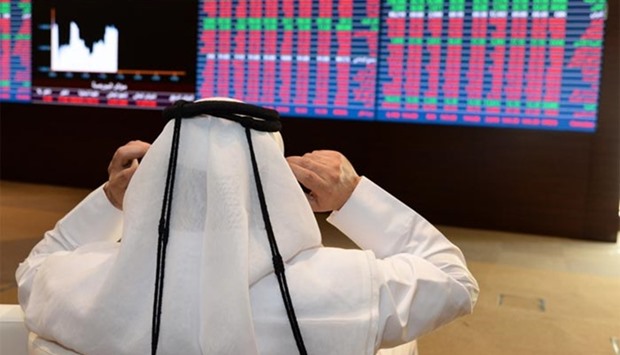The telecom, industrials and consumer goods counters saw higher demand, which led the 20-stock Qatar Index to surge 61 points, or 0.57%, to 10,731.53 points despite a slide in global oil prices on rising US inventory.
Non-Qatari individual investors’ buying interests, albeit at lower levels, also helped the market, which is up 2.82% year-to-date.
Islamic stocks were seen outperforming the main index and other indices in the bourse, where selling pressure weakened among domestic institutions.
Buying was seen more pronounced within the large and small cap segments in the market, where net selling by Gulf individual investors was on the decline.
Trade turnover and volumes were on the increase in the market, where realty, banking, telecom and consumer goods sectors together accounted for more than 84% of the total volumes.
Market capitalisation expanded about QR4bn, or 0.64%, to QR575.35bn as large, small and midcap equities gained 0.66%, 0.62% and 0.19% respectively; while microcaps lost 0.44%.
The Total Return Index gained 0.57% to 17,420.35 points, the All Share Index by 0.52% to 2,948.77 points and the Al Rayan Islamic Index by 0.86% to 4,067.61 points.
The telecom sector saw its index appreciate 2.59%, followed by industrials (0.95%), consumer goods (0.57%), banks and financial services (0.49%) and real estate (0.2%), whereas transport and insurance declined 0.51% and 0.43% respectively.
Major gainers included Ooredoo, Industries Qatar, QNB, Gulf International Services, Qatari Investors Group, Barwa, Qatar Islamic Bank, Masraf Al Rayan, Nakilat and Medicare Group; even as Doha Bank, Qatar Insurance, Qatar Electricity and Water, United Development Company, Mazaya Qatar, Vodafone Qatar, Alijarah Holding and Salam International Investment saw their stocks lose sheen.
Non-Qatari institutions’ net buying rose considerably to QR36.97mn compared to QR17.9mn on February 13.
GCC (Gulf Cooperation Council) institutions’ net buying rose substantially to QR26.64mn against QR0.38mn on Monday.
Non-Qatari individual investors’ net buying increased to QR1.65mn compared to QR0.9mn the previous trading day.
Domestic institutions’ net profit-booking declined marginally to QR13.71mn against QR15.26mn on February 13.
However, local retail investors’ net selling strengthened considerably to QR51.83mn compared to QR8.38mn on Monday.
GCC retail investors’ net buying weakened to QR0.23mn against QR4.46mn the previous trading day.
Total trade volume rose 20% to 9.35mn shares, value by 62% to QR383.92mn and deals by 70% to 5,849.
There was a 76% surge in the insurance sector’s trade volume to 0.3mn equities, while value more than doubled to QR20.3mn, but on a 9% fall in transactions to 233.
The banks and financial services sector’s trade volume soared 66% to 1.89mn stocks and value by 61% to QR99.67mn on more-than-doubled deals to 1,815.
The transport sector reported a 62% surge in trade volume to 0.42mn shares, 91% in value to QR16.44mn and 67% in transactions to 276.
The industrials sector’s trade volume expanded 25% to 0.75mn equities, value by 67% to QR57.15mn and deals by 87% to 1,071.
The real estate sector saw a 23% increase in trade volume to 2.7mn stocks, 40% in value to QR71.35mn and 63% in transactions to 1,044.
The consumer goods sector’s trade volume was up 5% to 1.54mm shares, value by 78% to QR84.98mn and deals by 36% to 932.
However, the market witnessed an 11% decline in the telecom sector’s trade volume to 1.75mn shares but on a 40% gain in value to QR34.02mn and 71% in transactions to 478.
In the debt market, there was no trading of treasury bills and government bonds.


